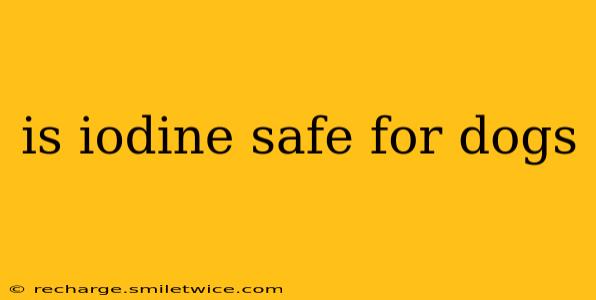Iodine, a crucial element for human health, plays a vital role in thyroid hormone production. However, the safety of iodine for dogs is a complex issue, and the answer is a resounding no, not generally. While trace amounts are naturally present in dog food, supplemental iodine should never be given to your canine companion without explicit veterinary guidance. This article delves into the reasons why, addressing common concerns and questions pet owners have about iodine and their furry friends.
Why is Iodine Dangerous for Dogs?
Dogs have different metabolic processes than humans, and ingesting excessive iodine can lead to serious health problems. The primary risk stems from iodine toxicity, which can manifest in various ways, depending on the amount ingested and the dog's individual sensitivity. Symptoms can range from mild gastrointestinal upset to severe thyroid dysfunction and even death in extreme cases. The danger isn't just from pure iodine, but also from products containing iodine, such as certain disinfectants and medications.
What are the Symptoms of Iodine Poisoning in Dogs?
Recognizing the signs of iodine poisoning is critical for timely veterinary intervention. Symptoms can vary, but some common indicators include:
- Gastrointestinal distress: Vomiting, diarrhea, loss of appetite
- Excessive drooling: This can be a significant sign of discomfort.
- Lethargy and weakness: Your dog may seem unusually tired or sluggish.
- Neurological issues: In severe cases, tremors, seizures, and even coma can occur.
- Respiratory problems: Difficulty breathing or rapid breathing.
- Skin irritation: If iodine comes into contact with the skin, it can cause redness, swelling, and itching.
It's crucial to note: These symptoms can mimic other illnesses, so prompt veterinary examination is essential. Don't attempt to self-diagnose or treat your dog.
Can Iodine Be Used to Treat Canine Conditions?
While iodine plays a crucial role in thyroid function, it should never be administered to dogs without a veterinarian's direct supervision. Veterinarians might use iodine preparations in very specific circumstances, such as treating wounds topically under strict control, but this is far different from supplemental iodine intake. Self-treating your dog with iodine could be extremely dangerous.
What Happens if My Dog Ingests Iodine?
If you suspect your dog has ingested iodine, whether through accidental exposure or intentional consumption, contact your veterinarian or an animal poison control center immediately. Time is of the essence, and prompt treatment can significantly improve the outcome. Provide them with as much information as possible about the incident, including the amount of iodine ingested (if known), the type of iodine product, and your dog's breed, age, and weight.
My Dog Needs Iodine, Right? What are the Signs of Iodine Deficiency?
Iodine deficiency is rare in dogs that eat a balanced, commercially prepared diet. However, signs of hypothyroidism (an underactive thyroid) can mimic iodine deficiency. These include weight gain, lethargy, hair loss, and skin problems. If you suspect your dog has a thyroid problem, consult your veterinarian. They can perform blood tests to check thyroid hormone levels and determine the appropriate course of action, which may or may not involve iodine supplementation (and if so, only under their strict supervision). Never attempt to self-diagnose or treat a suspected thyroid condition.
What Should I Do if My Dog Gets Iodine on Its Skin or Fur?
If iodine comes into contact with your dog's skin or fur, rinse the affected area thoroughly with lukewarm water. If irritation persists, or if a large area is involved, consult your veterinarian.
What are Some Common Household Items Containing Iodine?
Many household items can contain iodine, making accidental ingestion a possibility. These include some disinfectants, antiseptic solutions, and certain medications. Keep these products out of reach of your pets.
In conclusion, while iodine is essential for various bodily functions, its use in dogs should be strictly limited to situations under the guidance of a veterinarian. Accidental ingestion or inappropriate supplementation can have severe consequences. Always prioritize your pet's safety and consult your veterinarian before using any medication or substance not explicitly recommended for canine use.
